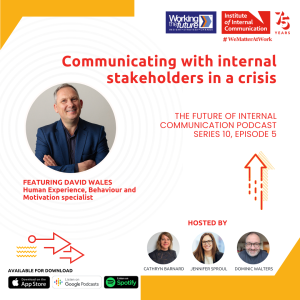

38.1K
Downloads
92
Episodes
The Future of Internal Communication podcast is hosted by The Institute of Internal Communication – the only professional body solely dedicated to internal communication. This podcast hosts a range of subject matter experts from within and outside internal communication, each sharing their insights on the future of internal communication. These thought-provoking discussions address the critical role of communication as a driver of workplace trust, connection, community, collaboration, innovation, engagement, culture, change, resilience and performance. Organisations today face a rising tide of challenges, causing widespread disruption and demanding wholesale business transformation. How colleagues communicate both on- and off-line is the glue that holds organisations together. Communication cultivates goodwill and drives alignment around a shared purpose. In a rapidly evolving world, Jennifer Sproul, Dominic Walters and Cat Barnard explore opportunity for internal communicators. As work becomes increasingly digital, data driven, distributed and on-demand, their conversations with thought-leaders examine the human side of work. This series showcases the critical link between empathic communication and workplace trust, connection, community, collaboration, innovation, engagement, culture, change, resilience and performance.
Episodes

Tuesday Jul 09, 2024
Communicating with internal stakeholders in a crisis with David Wales
Tuesday Jul 09, 2024
Tuesday Jul 09, 2024
David Wales’ interest in human behaviour stems from his career in the UK Fire Service. While there he held roles as investigation and research lead, emergency incident command and he helped develop national policy. In that time, he became fascinated by the difference between the advice given by professionals and the actions taken by people when they were confronted with emergency situations.
In this episode, Cat, Dom and Jen hear what David has learned about crisis communication. By focusing on human behaviour rather than cost, efficiency and standardisation, organisations can create shared language and communication that aids understanding for an optimal number of stakeholders.
Takeaways
- Effective crisis communication requires understanding human behavior and the lived experience of individuals in crisis situations.
- There is often a communication breakdown between public service providers and recipients, leading to a lack of understanding and satisfaction with the services provided.
- Empathy, humility, and relatedness are essential in crisis communication to connect with individuals on a human level.
- Emotions play a significant role in crisis situations, and communication needs to consider the emotional mindset and psychology of individuals.
- Building relationships and trust with the community is crucial for effective crisis communication. Understand and respect the perspectives of others in communication
- Build trust and involve employees in decision-making processes
- Prioritize community preparedness and responsiveness in crisis situations
- Shift from top-down approaches to bottom-up approaches in organizations
- Build relationships, be curious, and work with people to create effective communication strategies
About David Wales
David advocates for rethinking the relationship between organisations and people to improve the wellbeing and performance of both.
He is the Founder of the SharedAim Ltd consultancy which has a unique approach to helping organisations deal with the cost and disruption of unexpected behaviours (for example by employees, customers, partners or any other groups it interacts with). He is also the Founder and host of the Purposefully Human Community which provides a space for anyone interested in the benefits of creating organisations that work with, and celebrate, what it means to be human.
A multi-award winning professional, established presenter, facilitator and author, he is currently writing a book outlining how organisations can authentically work with human behaviour, rather than against it.
Prior to this David was an operational fire and rescue (FRS) officer with responsibilities for community safety and fire investigation. It was here that he first developed an understanding and interest in all aspects of communication. He also led a pioneering research programme into human behaviour (when encountering a fire in the home) which remains influential on international thinking and practice. And this subsequently led to David being appointed as the first Customer Experience Manager in the FRS.
No comments yet. Be the first to say something!